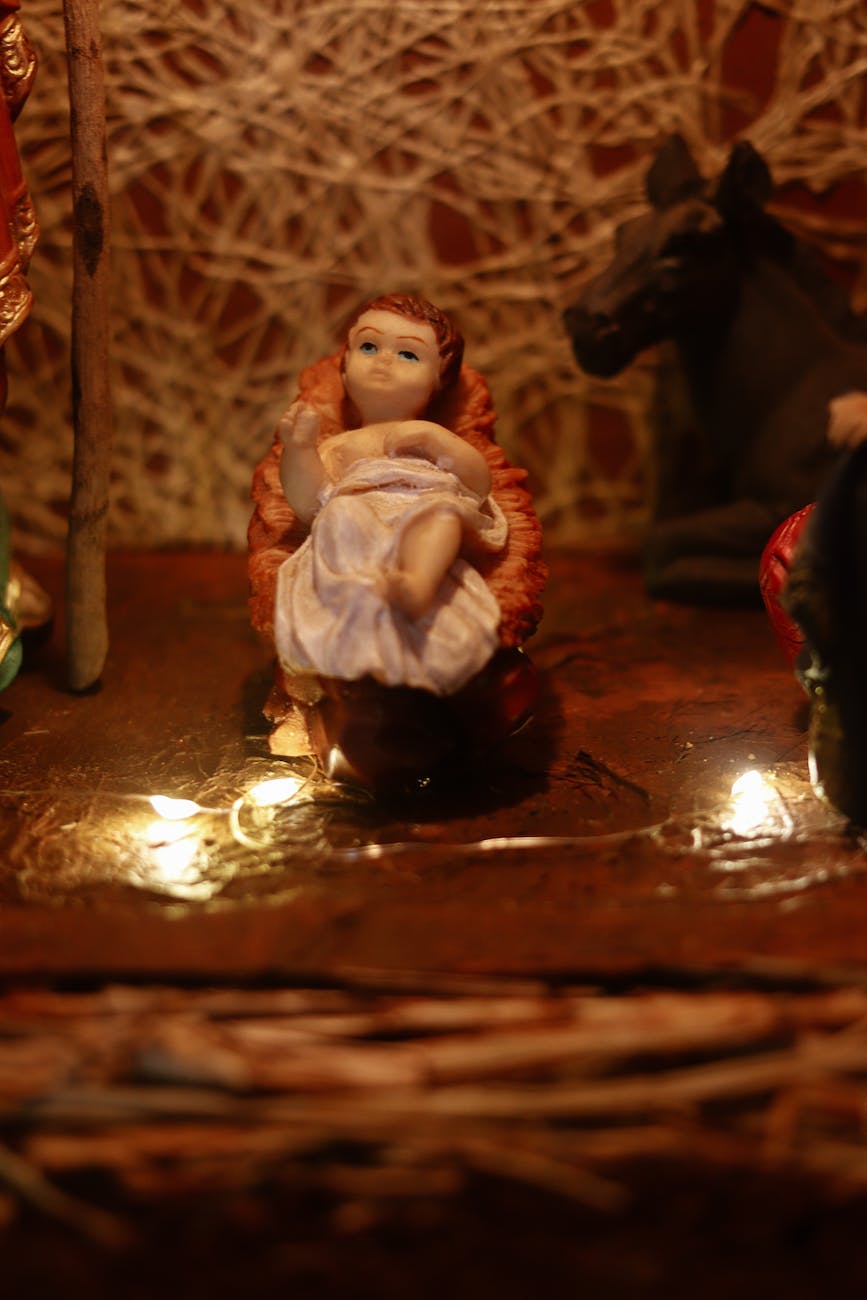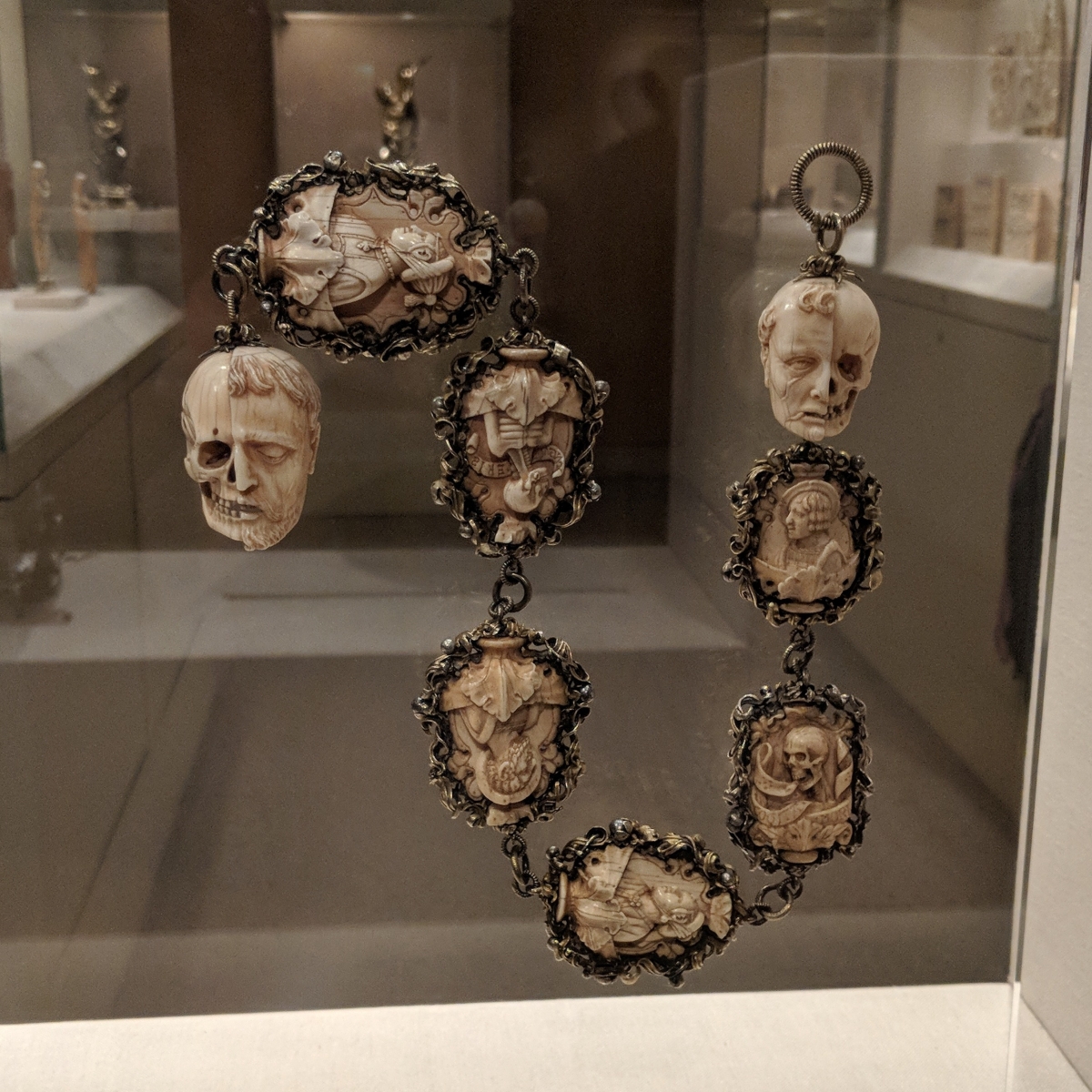I preached this sermon on Christmas Eve, December 24, 2022, at Trinity Episcopal Church, Fort Wayne. The lectionary text cited is Luke 2:1-20.
A couple of years ago, after both of my grandparents were gone and their house was in the process of being emptied and sold, I received a package in the mail. My cousin had sent me a few of my grandmother’s Christmas decorations, including an ornament or two and one of those plug-in yule logs from the 1950’s with electric candles on top of it. It meant a lot to receive these things and to be able to put them up alongside my own childhood decorations.
And among my grandma’s decorations was a small, slightly timeworn Nativity set. The figures have a few chips and cracks, a fragment missing here or there, and it’s just the bare essentials: Mary and Joseph and the baby Jesus in the manger, and a donkey and an ox. That’s it. No shepherds or angels or wise men. Just the Holy Family and a couple of animals attending them. At first I thought maybe some pieces were missing, that the scene felt incomplete, but now I have come to love the simplicity of the scene—how these few figures capture a quiet moment before the arrival of the angels with their songs and the clamoring shepherds with their questions. The donkey and the ox, it seems, are able to simply take the miracle in stride.
It’s interesting, as much as we love animals, that we don’t usually say much about the ones present on that wondrous night in Bethlehem, although they show up in nearly every depiction of the Nativity. If you read the text from Luke closely, you might be surprised to notice that no animals are explicitly mentioned. The Christ child is laid in a manger, a sort of feeding trough for livestock, but the creatures themselves are only implied by the setting.
In fact, it’s in the first chapter of Isaiah, and not in the Gospels, that we discover the donkey and the ox who eventually wandered their way into our collective imagination and into my grandmother’s Nativity set. They are found when the prophet says:
The ox knows its master, the donkey its owner’s manger, but Israel does not know, my people do not understand.
The implication of Isaiah is that it’s the animals, embedded as they are within creation, who are able to recognize their true source of life and sustenance in ways that we humans, in our delusions of self-sufficiency, are not able to do. God longs that his people might be as trusting and dependent and open to his protection and providence as the donkey and the ox are to their caregivers. But are we? As we arrive at our Lord’s manger on Christmas, as we behold, in the flesh, the Redeemer of the Earth, do we finally understand who he is, what he offers, what he asks?
The question persists, and the donkey and the ox bear witness. In the early centuries of the church, the combination of Isaiah’s imagery and the nativity account were blended into a verse composed by an unknown author and chanted for centuries in Latin at the midnight prayer office on Christmas Day: O Magnum Mysterium. O Great Mystery. In English, it reads:
O great mystery and wonderful sacrament, that animals should see the newborn Lord, lying in a manger! O blessed virgin, whose womb was worthy to bear the Lord Jesus Christ. Alleluia!
A simple verse, but it contains much to ponder. For it says that the Magnum Mysterium, the Great Mystery, is not just the birth of Jesus, but the witnesses to that birth—that it was the animals, before anyone else, who beheld the Lord in his manger. It was the animals, not the shepherds, not the wise men, who first saw their Creator enter his creation and then gathered in to greet him. Only the animals, wordless, attentive, uncalculating. They knew their master’s voice, they recognized their owner’s manger, and so they huddled close, sharing their solid warmth with him and his mother in the chill of that silent, holy night.
What can this scene teach us, we who still struggle to understand?
It is often said that our Savior being born into such a setting is a sign of God’s humility; that it is a great self-emptying of divine power to be born as a helpless infant, surrounded by animals, lying in a feeding trough. And God’s humility is indeed part of the Great Mystery of Christmas, but I think we miss something important if we just leave it at that.
Because anyone who has worked with animals, or who has simply cared for and loved them, knows that they possess their own sort of wisdom, their own inherent dignity and grace. Not just the donkey and the ox, but all of God’s creatures play their own role in the vast network of interdependent life on this earth, each carrying in their very bones a knowledge of what they are, and what they must do to live, to flourish, to endure. Animals are different from us, but they are not lesser than us.
And so perhaps for Christ to be born into their company is not so much about divine self-abasement as it is a sign of human reconnection with the fundamentals that shape and sustain all of life, including our own: birth, and death, and nourishment, and warmth, and companionship, and trust. All of us need these things. All of us can give these things.
Perhaps the Great Mystery that we glimpse this night, alongside the animals at the manger, is not God’s weakness, but God’s true, elemental strength. For what is stronger than showing up in deep solidarity with creation? What is mightier than taking part in the persistent, generative power shared by all living things?
What if the wonderful sacrament is not to be understood so much as Christ descending into a poor and helpless form, but as the Creator arising into his creation, emerging from the hidden depths of the cosmos, from the womb of his mother, from the cradle of eternity, to claim all the earth as his own beloved home, to name all living things as his kin—as sacred partners in the unfolding birth of the Kingdom?
For it should not be lost on us that the very things Jesus will later name as our essential Christian vocation—feeding the hungry and thirsty; sheltering the weak; being present to the most vulnerable,—these things are not lofty theological propositions. They are creaturely things: old, and instinctive, and earthy. They are the basic stuff of life. And they are, O Magnum Mysterium, the very things that the animals offered Jesus that first night in Bethlehem.
For the ox knows its master, and the donkey its owner’s manger.
But the question remains: do we know? Do we understand yet? Or are we so overwhelmed by the seeming complexity of God, or the complexity of our world, that we have forgotten the ultimate simplicity of what is needed, what is given, what is required of us in this life: to tread lightly and compassionately upon this earth in union with all of creation?
Might we, on this most blessed of nights, rediscover our truest selves? We who are made in the image of the God who now bears our image, too. We who are called only to love; called only to sustain one another, to sustain the earth, as he sustains us. O Great Mystery, that life— messy, tearstained, bleeding, breathing, fragile, undaunted, beautiful life—is itself the most wondrous sacrament of all.
In it, may we finally come to see that Christ is not born this night to save us from our humanity, nor to deliver us from the world he has made, but to inhabit these things fully, to love them fully, that we might gather alongside all creatures, to behold the majesty of God in the flesh, and to join our voices with the song of the angels and the bray of the donkey and the bellow of the ox, a chorus of unceasing praise. Tonight, may the whole world at last know its master, know its Lord’s manger, and thereby know itself for what it is—beloved, sustained, redeemed.
The Nativity scene is here, in our midst. Our Savior awaits. What the animals did first and best, let us do so now, too, with the joy that is fullness of life.
Come, let us adore him.


